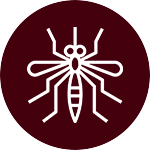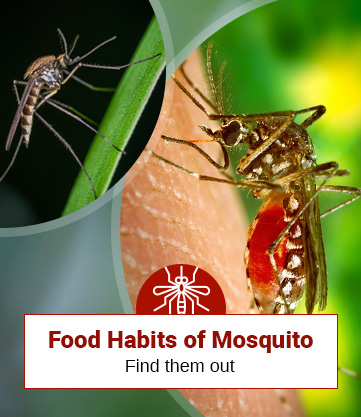 get free exterminator quotes
get free exterminator quotes


“It is astonishing how much worse one mosquito can be than a swarm. A swarm can be prepared against, but one mosquito takes on a personality—a hatefulness, a sinister quality of the struggle to the death.” ― F. Scott Fitzgerald
If you’re wondering what mosquitoes eat, then there isn’t only one answer which fits every scenario. The correct answer depends on the life cycle of that particular mosquito. Also, it depends on whether that mosquito is a male or a female.

Full-sized adult mosquitoes rely on the nectar or the honeydew produced by the plants to receive sugar which provides the insects with nourishment for both males and females to survive. The problem for mosquitoes arises when they need protein to produce eggs that they cannot get from plants. To make eggs, the female mosquito has to start the hunt for blood.
There are only a couple of species of mosquitoes that can produce eggs without sucking the blood of animals and humans, and they’re in the vast minority. When it comes to the quality of blood, the mosquitoes aren’t fussy at all. Whether they are sucking the blood of a human being, a mammal, a reptile or a bird – they are all a good game for the mosquito, although different species of mosquitoes certainly have their own preferences.
Some intentionally live near abodes of human settlement to bite them, whereas others live near farms to hunt on livestock or other animals. The nature of a female mosquito isn’t much different than that of a serial killer. After the female mates, has her lust of blood quenched and lays her eggs, she instantly restarts her hunt and if she gets enough blood or protein again, she will be able to lay another batch of eggs without mating.
If she manages to survive without being killed, then a female mosquito can lay thousands of eggs in one summer. On average, a female mosquito can lay around 200 eggs in one go, depending on the species. When the mosquitoes aren’t looking for blood, you can almost ignore them as being harmless, as during that time they feed on a variety of different plants depending on the preference of the species.
The life cycle of a mosquito will have four stages in it, and their feeding habits differ drastically depending on it. The four stages are Egg state, Larva state, Pupa state, and Adult state.
An adult female mosquito can lay around 200 eggs at a go, but she has to lay them all one by one individually. The eggs are almost always laid in stagnant or stale water. Water which is moving a little bit isn’t a worry for the eggs, but it will never be laid in a fast stream or a river. The young who are inside do not eat any food at all.
Just like a chicken egg, the young developing inside that of a mosquito egg gets all of its nutrients from the yolk and other materials inside the egg. All of the nutrition being supplied right now is converted from blood and the nutrients that get sucked out of the prey of mosquitoes and get converted into all of the goodness inside the egg.
When the young hatch out of their eggs, they are then called larva. The larva is aquatic but they do not have fins which can help them swim. They just wander around for a while, struggling and wiggling for a while. The Mosquito larva needs to live in the water but at the same time, they need air to breathe.
This is why the water needs to be stagnant. Running water would take the eggs or the larva downstream. Larva, unlike the egg state, needs to eat food. They eat stuff such as the fungus, algae, and bacteria which can only grow in motionless and stagnant water.
They literally can’t eat anything else, and if the water isn’t motionless or stagnant, then the food which the larva eats won’t exist and the larva will die. This is also why it is always recommended not to keep any stagnant water at home, as it’s a perfect breeding grounds for a mosquito.
The pupa (or pupae) stage of a mosquito is also called the tumbler state because all it can do during this phase is swim through the water by tumbling, and this is the way how it avoids predators (such as frogs) who would eat the pupa otherwise.
In this phase, the pupa again needs to eat no more food. It has already eaten the food in its earlier larva form such as fungus, algae and the bacteria and it has loaded itself so it can begin its next metamorphosis into an adult mosquito.
Around ten days or so after the eggs have been laid, the pupa finally metamorphoses into an adult mosquito, the big baddie villain in the world of insects worldwide. They leave the world of water behind and say hello to the aerial life, annoying billions of humans worldwide.
Adult mosquitoes only need sugary substances that they can get from plants. They get the sugar from drinking nectar and other plant fluids such as their juices. The male mosquitoes only live for a week or so and their only living purpose is to mate with the females and they die soon afterward. The male mosquitoes also never suck blood.
The female mosquitoes, on the other hand, are the reason why mosquitoes get such a bad rep around the globe. After the female mate with the male, they basically turn into vampires and start craving blood for the enormous amounts of protein in it. Without the protein in the blood, there is no way for the female to lay the eggs. Female mosquitoes will suck blood without discrimination, whether they be animals, birds or human beings.
Click here and access our exterminator search tool- instantly get free quotes from the authentic house of exterminators in your local area.
Get FREE QuotesProcess Takes About 30 Seconds
Mosquitoes manage to bite us all summer long yet they disappear when there is a nip in the air. A mosquito has four stages of their life: egg, larva, pupa, and adult. Eggs are laid by the female mosquitoes in or around standing water areas and all they need is as much as a bottle cap can hold.
The eggs hatch into larvae within 48 hours and then the larvae develop into a pupa within a week. Depending on the species of the mosquito, they last from a couple of days till up to a month. Only the female mosquitoes bite for blood, and they do that because they need the protein in the blood to made eggs.
One of the most terrifying facts about mosquitoes is that warm and humid climate fastens the reproduction cycle of these blood-sucking insects. When the temperature starts regularly dropping below 12 degrees Celsius, then mosquitoes start hibernating, and some of them even start looking for holes to hide in till the warmer months arrive again.
Other species of mosquitoes simply lay their eggs in cold water and wait till the warmer months to return. When the weather is warm enough, then the eggs hatch automatically and the life-cycle of these pests starts again.
One of the most fascinating facts about these creatures is the fact that they find humans and their settlements by actually smelling and looking out for human breath. They have receptors on their antennae for carbon dioxide, which basically means that the carbon dioxide which we exhale leads these nasty bugs straight to us.
Even worse for us, the human body excretes out more than 320 types of chemical odors which make us even tastier for blood-sucking mosquitoes. Even some repellents can be ineffective against mosquitoes and they can be what lures them to us. Last but not least, mosquitoes have heat-seeking sensors around their mouths which can indicate healthy people from whom to suck warm and tasty blood.
Only female mosquitoes draw blood from their prey, and they need to do that because they need warm blood for the protein and other vital nutrients in it. Female mosquitoes have a long, thin proboscis or their mouthpiece which, although, similar to that of a male mosquito, is thinner and more efficient at drawing blood from their prey.
After the female mosquito has landed on their prey, then they probe the skin using their proboscis and saliva is injected. The saliva has chemicals in it which numbs the skin which makes the victim less noticeable to act upon what’s happening, thins the blood and makes it easy for the mosquito to suck it up.
The effect of the saliva and the bite is what keeps itching afterward. When the mosquito finds the capillary, which is filled with blood, she inserts her proboscis and keeps drawing blood until her gut is full or till it is swatted away.
Contrary to popular belief, mosquitoes don’t spread diseases by transferring blood from one victim to another. Instead, the diseases are spread because of their injected saliva which already has the diseases in it. That is also the reason why mosquitoes can only spread specific diseases such as Dengue, Malaria or Chikungunya and no other diseases as they thrive inside the body of the female mosquito.
Click here and access our exterminator search tool- instantly get free quotes from the authentic house of exterminators in your local area.
Get FREE QuotesProcess Takes About 30 Seconds